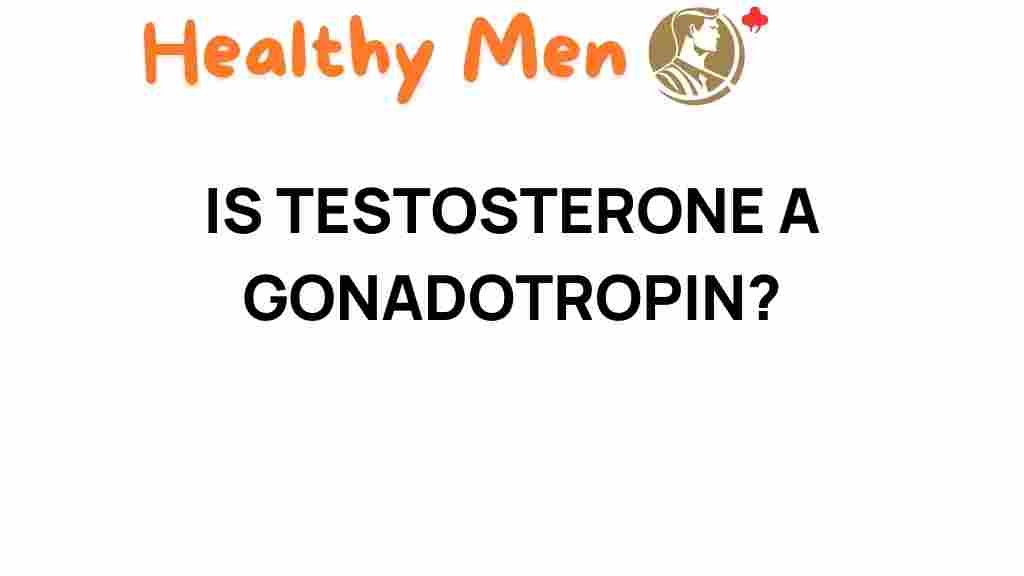Unraveling the Mystery: Is Testosterone a Gonadotropin?
Testosterone is a vital hormone that plays a crucial role in male health, influencing everything from physical development to reproductive function. As we delve into the world of hormones and the endocrine system, a common question arises: is testosterone a gonadotropin? In this article, we will explore the relationship between testosterone and gonadotropins, understand their functions in the body, and discuss their significance in male fertility and overall health.
Understanding Hormones and the Endocrine System
The endocrine system is a network of glands that produce and release hormones. These hormones regulate various bodily functions, including metabolism, growth, and mood, and are essential for maintaining homeostasis. Key players in this system include:
- Gonadotropins: Hormones that stimulate the gonads (testes in males, ovaries in females). The primary gonadotropins are luteinizing hormone (LH) and follicle-stimulating hormone (FSH).
- Testosterone: The principal male sex hormone, produced primarily in the testes, responsible for the development of male characteristics and reproductive functions.
The Role of Testosterone in the Body
Testosterone is primarily produced in the Leydig cells of the testes and is crucial for male development and health. Its functions include:
- Development of male reproductive tissues such as the testes and prostate
- Promotion of secondary sexual characteristics like increased muscle and bone mass, and body hair
- Regulation of libido (sexual drive)
- Contribution to overall mood and energy levels
What Are Gonadotropins?
Gonadotropins are hormones released by the anterior pituitary gland and play a critical role in regulating reproductive health. The two primary gonadotropins are:
- Luteinizing Hormone (LH): Stimulates testosterone production in the testes.
- Follicle-Stimulating Hormone (FSH): Stimulates sperm production in the testes.
Both LH and FSH are essential for male fertility, as they signal the testes to produce testosterone and sperm, respectively.
Testosterone vs. Gonadotropins: The Connection
While testosterone is not classified as a gonadotropin, its production is directly influenced by the gonadotropins LH and FSH. The relationship can be summarized as follows:
- LH stimulates Leydig cells in the testes to produce testosterone.
- FSH acts on Sertoli cells to support sperm maturation, indirectly relying on testosterone levels.
This intricate system of hormone regulation highlights the importance of gonadotropins in maintaining testosterone levels and, consequently, male fertility.
The Physiology of Hormone Regulation
The regulation of testosterone and gonadotropins is a complex process involving feedback loops. When testosterone levels are low, the hypothalamus releases gonadotropin-releasing hormone (GnRH), which stimulates the pituitary gland to release LH and FSH. This, in turn, signals the testes to produce more testosterone.
Conversely, when testosterone levels are sufficient, the feedback loop reduces GnRH release, leading to decreased LH and FSH production. This regulation ensures that hormone levels remain balanced within the body, which is crucial for male health.
Impact of Testosterone on Male Fertility
Testosterone plays a pivotal role in male fertility. Here are some key points regarding its impact:
- Low testosterone levels can lead to decreased libido, erectile dysfunction, and reduced sperm production.
- Optimal testosterone levels are necessary for the development of healthy sperm and overall reproductive function.
- Hormonal imbalances can disrupt the intricate feedback system, leading to fertility issues.
Common Issues Related to Testosterone and Gonadotropins
Men may experience various issues related to testosterone and gonadotropin levels, including:
- Hypogonadism: A condition characterized by low testosterone levels, which can result in infertility, fatigue, and loss of muscle mass.
- Hypergonadism: Excessively high testosterone levels may lead to aggressive behavior, mood swings, and health complications.
- Hormonal Imbalances: Irregularities in LH and FSH can affect testosterone production and sperm development.
Troubleshooting Hormonal Health
If you suspect hormonal imbalances affecting your health, consider the following steps:
- Consult a Healthcare Provider: A healthcare professional can guide you through testing and diagnosis.
- Get Blood Tests: Blood tests can measure testosterone, LH, and FSH levels to provide insights into your hormonal health.
- Review Lifestyle Factors: Diet, exercise, sleep, and stress can significantly impact hormone levels. A balanced lifestyle can help regulate hormones effectively.
Conclusion
In conclusion, testosterone is a vital hormone for male health, but it is not classified as a gonadotropin. Instead, testosterone production is regulated by gonadotropins like LH and FSH, which play essential roles in male fertility and hormonal balance. Understanding this relationship helps unravel the mystery of how these hormones interact within the endocrine system.
Maintaining healthy testosterone levels is crucial for overall well-being, male fertility, and physiological health. If you’re experiencing symptoms related to hormonal imbalances, it’s essential to seek professional guidance to ensure your endocrine health is optimized. For further reading on hormone regulation and male health, visit this resource.
For more insights on biology and health-related topics, check out our articles on hormone regulation.
This article is in the category Conditions and created by healthymen Team

1 thought on “Unraveling the Mystery: Is Testosterone a Gonadotropin?”